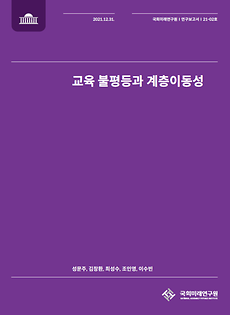
This study investigated the trend of educational inequality in Korea, focusing on the extent to which family and income background and gender affect access to higher education.
Chapter 1 briefly addressed the discourse on overall education inequality in Korea as an introduction.
Chapter 2 addressed the inequality and gender gap in college entry, analyzing the latest panel data. Through the analysis, it was found that in terms of admissions to four-year and prestigious universities, the gender gap completely disappeared and differences only existed between classes.
However, it was newly found that the gender gap between men and women in lower class is growing with respect to admissions to college and four-year universities. Meanwhile, the gap between men and women in the selection of science and engineering majors was not narrowed, but instead was strengthened.
Chapter 3 focused on educational inequality and gender gaps in graduate school advancement in Korea using the latest data. In the graduate school entrance analysis, the influence of the socioeconomic class of the student's family on advancement to graduate school was confirmed. The results showed that the socioeconomic class of the student's family had a statistically significant correlation with graduate school advancement in Korea. In addition, it was confirmed that the degree of the correlation between parents' income and education level and graduate school advancement differs by gender. The findings imply that family background is a more important determinant for women going to graduate school than men.
Lastly, Chapter 4 provided implications for policy-making based on these findings.